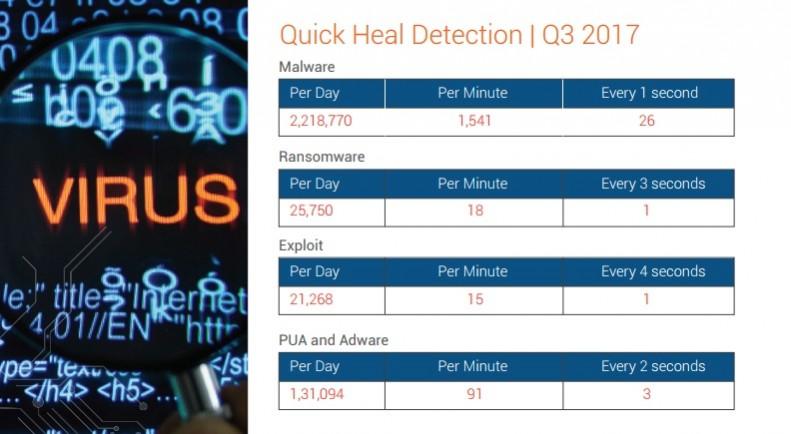This year has been harsh when it comes to cyber attacks with thousands of people coming under attack on the internet after some of the most malicious ransomware including WannaCry and Petya creating havoc to the public. What is even more surprising is that such cyber attacks continue to this day.
According to Quarterly Threat Report (Q3 2017 report) by IT security solutions provider Quick Heal Security Labs, over 25,000 ransomware infections happen to Windows on a daily basis and 199 million malware detections in Q3 2017, which is 2,218,770 every day.
Also read: India among top 10 target countries for web application attacks in Q2 2017: Study
There is an 11 percent decrease in malware detection in Q3 compared to Q2 but that should not be taken as a respite as ransomware keep attacking vulnerable users incessantly across the world, said the report.

Nine new ransomware families were detected in this quarter and new variants of Cryptomix, Petya, Arena, Aleta and Locky have been detected, according to the report. LNK.Browser.Modifier, which is a Trojan that injects malicious codes into the browser that redirects the user to malicious links, is the top Windows malware of Q3 2017 and the Trojan family had the highest detection rate followed by infectors, worms, and adware.
Quick Heal Security Labs also detected over two million Android infections in Q3 ending September, which is a 40 percent increase compared to the previous quarter. Third-party app stores continue to be the top source of malicious apps. Android vulnerability has become a major concern as malware creators can access private and personal information of a device user by breaking into it.

Android ransomware works just like ransomware does to Windows. It locks your device or encrypts the stored data and demand a ransom to release the data or the phone.
"Our threat reports are an attempt to provide insights on the threat landscape with the objective of facilitating a safe and secure digital journey of our customers," Sanjay Katkar, Joint Managing Director and Chief Technology Officer, Quick Heal, told IANS.









!['Had denied Housefull franchise as they wanted me to wear a bikini': Tia Bajpai on turning down bold scripts [Exclusive]](https://data1.ibtimes.co.in/en/full/806605/had-denied-housefull-franchise-they-wanted-me-wear-bikini-tia-bajpai-turning-down-bold.png?w=220&h=138)



